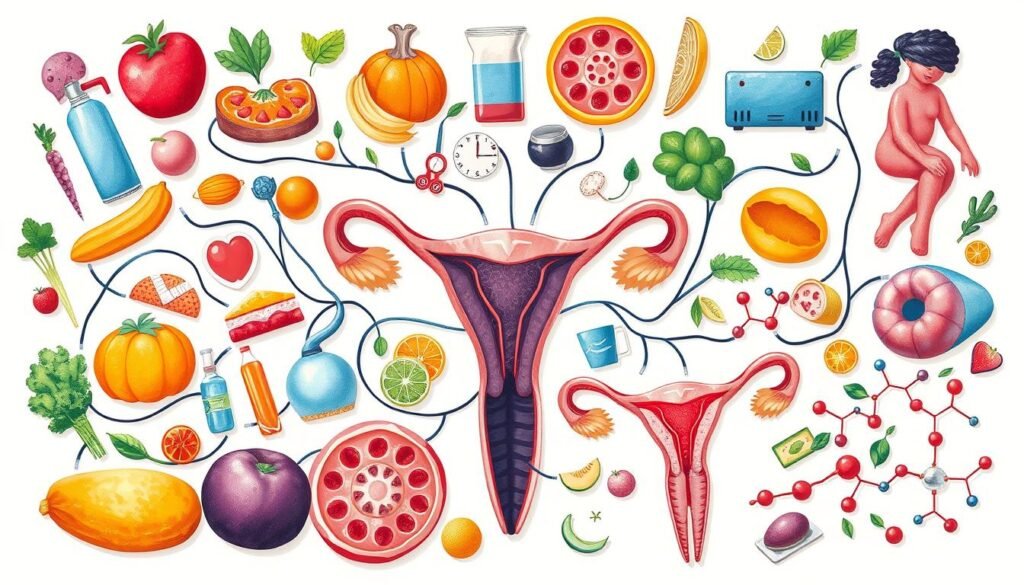Over 7% of women of reproductive age in the United States have Polycystic Ovary Syndrome (PCOS). This fact highlights the importance of examining PCOS closely, especially the impact of environmental triggers, diet, and lifestyle. These elements are crucial for managing the condition effectively.
There’s a deep connection between sustainable living and health, beneficial for the environment and people with health issues like PCOS. By knowing how the environment affects diet and lifestyle, individuals can make better choices. These choices improve their health and their strategies for managing PCOS.
Key Takeaways
- PCOS affects approximately 7% of women in the U.S., highlighting its prevalence.
- Environmental triggers play a crucial role in PCOS management.
- Diet and lifestyle choices significantly impact health outcomes for individuals with PCOS.
- Sustainable living practices can promote better health for those with hormonal disorders.
- Understanding the interconnectedness of the environment and personal health is essential.
Understanding PCOS and Its Connection to the Environment
Polycystic Ovary Syndrome (PCOS) is a big health issue for many women. It comes from both genetics and environmental factors. Women with PCOS may have irregular periods, high androgen levels, and polycystic ovaries. Knowing how environmental factors affect these symptoms can help manage them better.
Our environment greatly affects our lifestyle choices. These choices can influence our hormonal balance. Where we live and our culture can shape our diet. A diet full of whole foods can help improve PCOS symptoms.
Being active is also key in managing symptoms. People who exercise regularly tend to have better health and hormone levels. Managing weight is crucial for controlling hormonal imbalance symptoms.
Stress and emotional health are linked to our environment too. Handling stress well can boost hormonal function, improving life quality for PCOS sufferers. Mindfulness, being aware of the environment, and having strong social support are all important.
Dealing with PCOS and environmental factors needs active involvement. Understanding these connections allows women to make informed health choices. By aligning lifestyle choices with their environment, they can achieve better hormonal balance.
What Are Environmental Triggers?
Environmental triggers are outside factors that greatly influence our health. This is especially true for conditions like PCOS. Knowing what these triggers are helps us manage them better. Things like what we eat, how we live, and the environment affect our health a lot. Coming into contact often with allergens, polluted air, and sudden temperature changes can make hormone-related symptoms worse.
Here are some examples of these triggers:
- Allergens such as pollen and dust mites
- Tobacco smoke and other pollutants
- Climate conditions, including humidity and temperature changes
- Stressful life events that induce emotional responses
Everyone reacts differently to these environmental triggers. This means asthma and PCOS management must be tailored to each person. Identifying and limiting these factors can boost our health. It can also cut down on the need for immediate-relief medicines. There are effective ways to reduce our exposure to these triggers. Find more information on this topic here.

The Impact of Diet on PCOS Management
Diet is a big deal when managing Polycystic Ovary Syndrome (PCOS). Changing what you eat can lessen symptoms and boost health. Knowing how diet and PCOS are linked helps people make smarter food choices. Adding foods full of nutrients can help balance hormones better.
Key Dietary Changes for PCOS
Eating better can really help with PCOS. Aim for whole foods like fruits, vegetables, grains, and lean meats. These foods keep insulin levels even. This is key to fight insulin resistance, a problem in PCOS. Cutting down on sugar and processed foods is also smart. These can make symptoms worse.
- Add more plant proteins like beans and legumes.
- Opt for healthy fats in avocados, olive oil, and nuts.
- Drink lots of water and skip sugary drinks.
- Eat high-fiber foods to help with digestion and gut health.
Changing what you eat doesn’t just help with weight. It also boosts overall health. This lays the groundwork for better PCOS management.
Microbiome and Diet: A Closer Look
Your microbiome’s health is key for hormonal balance and health. A balanced gut flora helps with metabolism and eases PCOS symptoms. Studies show eating a variety of nutrients supports a healthy microbiome. This helps with PCOS management.
To improve gut health, try:
- Eating fermented foods like yogurt, kefir, and sauerkraut for probiotics.
- Adding prebiotic foods such as garlic, onions, and asparagus that nurture good gut bacteria.
- Ensuring a broad mix of fruits and veggies for essential vitamins and minerals.

By making these dietary changes, you can help your gut health flourish. This supports better hormone control and health outcomes. It’s a smart way to manage PCOS effectively.
How Lifestyle Choices Influence PCOS Symptoms
Lifestyle choices have a big impact on managing polycystic ovary syndrome (PCOS). Changing some daily habits can greatly improve symptoms. This part talks about how important exercise and stress management are. They help keep hormones in balance and improve overall health.
Physical Activity and Hormonal Balance
Being active is key for keeping hormones in check. Exercise improves insulin sensitivity, which is crucial for PCOS. Walking, cycling, or yoga helps with weight control and boosts mood and energy. Adding physical activity to your life can ease many PCOS symptoms.
Women with PCOS who work out regularly see benefits. They have lower androgen levels and more regular periods. Making healthy lifestyle choices lifts your quality of life.
Stress Management and Its Effects on PCOS
Handling stress is just as important for PCOS. Stress can make symptoms worse by messing with hormones. Mindfulness, meditation, and yoga are good for relaxation and clear thinking. These help manage stress and are good for hormonal health.
Research shows that taking care of your mental health can regulate body functions affected by PCOS. Looking after your mental and physical health helps tackle many aspects of the condition.

Environmental Triggers: Climate Change and PCOS
Climate Change is a big problem that affects health everywhere. Research shows it’s linked to worse PCOS symptoms. Weather changes can make food hard to get. This may change what we eat and harm our hormones.
Climate change also brings more stress. This stress can make PCOS symptoms stronger. It’s hard to manage hormones and health because of it. We need to understand how climate change and PCOS connect. This helps us see how our environment changes our health.
To learn more, look into how the environment affects PCOS. Study the role of chemicals in PCOS to find better ways to stay healthy. Check out this article for in-depth info.
The Role of Pollution in Hormonal Disruption
Pollution is a big problem for our hormonal systems. It really affects women with PCOS due to various pollutants. Things like plastics and certain chemicals have endocrine disruptors. These are bad for our reproductive health and can make PCOS worse.
Studies link poor air quality and chemicals to hormone imbalance. Bad environmental conditions can change hormone levels. This affects mood and health. Pollutants inside and outside harm not just reproductive health but also overall well-being.
To grasp pollution’s effects, let’s look at common pollutants and their impacts on health:
| Pollutant Type | Source | Impact on Hormones |
|---|---|---|
| Phthalates | Plastics, cosmetics | Linked to hormonal imbalance |
| Heavy metals | Industrial waste, contaminated water | Disruption of endocrine function |
| Gaseous pollutants | Vehicle emissions, factory runoff | May exacerbate PCOS symptoms |
It’s key to reduce exposure to pollutants to keep hormones balanced and the environment healthy. Lowering pollution helps our health and the community’s well-being. Knowing how pollution and health are connected helps manage PCOS better. For more information, check out research studies linking pollution and health issues.
Deforestation and Its Effects on Biodiversity Decline
Deforestation is causing biodiversity to decline, leading to loss of crucial habitats worldwide. This action upsets the balance of ecosystems and risks human health. It results in fewer varieties of life, bad for both the environment and public health.
Understanding Habitat Loss
Deforestation leads to the destruction of natural homes, directly causing habitat loss. This makes many species lose their shelters and reduces biodiversity. A drop in biodiversity weakens ecosystems, impacting food, water quality, and human services.
This change hurts population health, linking habitat loss to rising diseases.
How Biodiversity Affects Human Health
Biodiversity is key to healthy human life. It offers varied nutrients and supports natural healing methods. Yet, deforestation lessens these benefits by limiting resource availability.
This results in more allergies, breathing issues, and hormonal problems like PCOS.
| Impact of Deforestation | Biodiversity Decline | Health Outcomes |
|---|---|---|
| Loss of habitat for wildlife | Decrease in species variety | Increased disease risks |
| Altered water cycles | Reduction in pollinators | Higher allergy rates |
| Soil erosion | Threatened food systems | Hormonal imbalances |
Sustainable Living for PCOS Management
Living sustainably can make a big difference in managing PCOS. By choosing to lower our ecological footprint, we help our health and the planet. Adopting practices like mindful consumption and reducing waste helps balance hormones and improve well-being.
Reducing Your Ecological Footprint
To live more sustainably, consider making some easy changes. Here are a few ideas:
- Adopt a plant-based diet to lower greenhouse gas emissions.
- Choose locally sourced products to reduce transportation impact.
- Minimize single-use plastics to decrease waste.
- Practice energy conservation in daily routines.
- Engage in community recycling programs to enhance waste management.
Every small action helps reduce your ecological footprint and supports health, including PCOS management. Living sustainably can start with minor, consistent steps.
Environmental Regulations and Health Outcomes
Stricter environmental laws protect our health. They reduce harmful exposures that can affect hormonal balance. For example, cutting down on industrial emissions helps fight hormonal disorders like PCOS. Cleaner environments promote better air and reproductive health.
Pushing for strong environmental policies improves public health. Supporting sustainability initiatives is crucial, as they lead to healthier lives for people with PCOS.
| Action | Impact on Ecological Footprint | Health Benefits |
|---|---|---|
| Plant-based diet | Reduces emissions | Improves hormonal balance |
| Local sourcing | Decreases transportation impact | Supports nutrition quality |
| Single-use plastics reduction | Minimizes waste | Enhances environmental safety |
| Energy conservation | Lower energy consumption | Improved mental health |
| Recycling programs | Less landfill waste | Community health improvements |
Conclusion
The link between the environment and managing PCOS is key. It helps people control their health better. By looking into diet, lifestyle, and environmental factors, they can start to improve their health. It’s important to know about the environment because it affects hormones a lot.
Living healthy is crucial for dealing with PCOS. Making simple changes like eating more plant-based foods and cutting down on pollution exposure helps. These changes improve both physical and emotional health. People with PCOS can choose what’s best for them with this information.
The push for living sustainably is also important. It links personal health to the planet’s health. By living in ways that lower our impact on the Earth, we help ourselves and the world. Seeing PCOS management as part of being eco-friendly shows how personal and environmental health are connected.